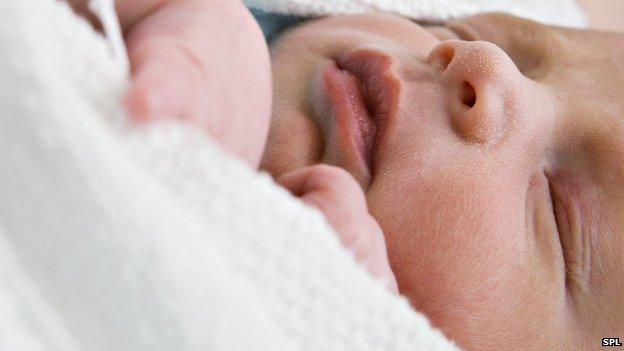C-section birth 'link to later obesity'
- Published

People born by Caesarean section are more likely to be obese later in life than those born naturally, a large analysis suggests.
The analysis of 38,000 births, , showed the odds of being obese were 22% higher.
The UK researchers say it is important women are informed about the long-term consequences of Caesarean section.
But experts said it was unclear what was really going on.
The study showed that for every 100 vaginal births, 60 adults would go on to be overweight or obese. But out of every 100 born by Caesarean section, there would be 65.
On average, being born by C-section added half a point to a person's body mass index (BMI).
One of the researchers, Dr Matthew Hyde from Imperial College London, told the “óĻó“«Ć½: "It is an increase of five in 100, which is a significant concern.
"It is only a half unit increase in BMI, but if you have that increase across a population you'll see a large increase in weight and the well publicised side-effects."
He said advice around childbirth was tailored to the immediate consequences for baby and mother, but long-term issues needed to be raised as well.
Previous research has hinted that other conditions, such as asthma, may be more likely after Caesarean birth.
Why so big?
There are two main theories about how vaginal birth could protect against obesity:
the stress of a natural birth may alter the activity of genes in the baby
a vaginal birth exposes the baby to bacteria that colonise the gut, so differences in gut bacteria could in the future affect weight
However, the study cannot prove that C-section makes people fatter as other factors could be at work.
This could include obese women, who are more likely to have obese offspring, being more likely to need a Caesarean.
Either way, researcher Prof Neena Modi said: "There are good reasons why C-section may be the best option for many mothers and their babies, and C-sections can on occasion be life-saving.
"However, we need to understand the long-term outcomes in order to provide the best advice to women who are considering Caesarean delivery."
Commenting on the study, Patrick O'Brien, a consultant obstetrician and a spokesman for the Royal College of Obstetricians and Gynaecologists, told the “óĻó“«Ć½: "It is important and interesting to flag up this association, but it is important to realise that it is hard to know for sure if it is the Caesarean section that led to this or whether something else was the cause."
He said it was important to be fair to women when advising them about the pros and cons of different methods of delivery, and that the theoretical long-term outcomes from vaginal birth would need to be discussed equally.
- Published23 November 2011
- Published24 May 2012
- Published11 May 2012